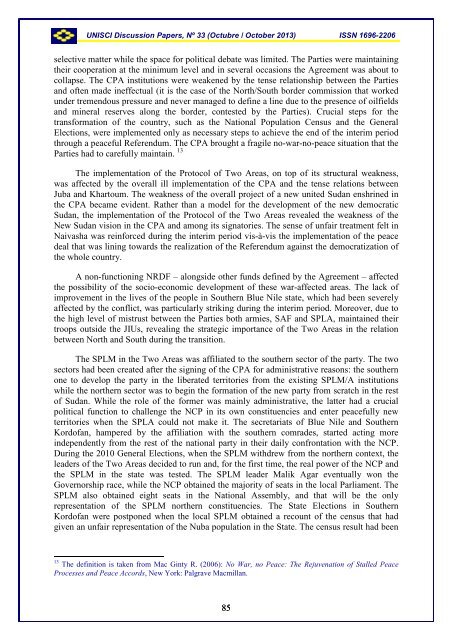UNISCI - Universidad Complutense de Madrid
UNISCI - Universidad Complutense de Madrid
UNISCI - Universidad Complutense de Madrid
You also want an ePaper? Increase the reach of your titles
YUMPU automatically turns print PDFs into web optimized ePapers that Google loves.
<strong>UNISCI</strong> Discussion Papers, Nº 33 (Octubre / October 2013) ISSN 1696-2206selective matter while the space for political <strong>de</strong>bate was limited. The Parties were maintainingtheir cooperation at the minimum level and in several occasions the Agreement was about tocollapse. The CPA institutions were weakened by the tense relationship between the Partiesand often ma<strong>de</strong> ineffectual (it is the case of the North/South bor<strong>de</strong>r commission that workedun<strong>de</strong>r tremendous pressure and never managed to <strong>de</strong>fine a line due to the presence of oilfieldsand mineral reserves along the bor<strong>de</strong>r, contested by the Parties). Crucial steps for thetransformation of the country, such as the National Population Census and the GeneralElections, were implemented only as necessary steps to achieve the end of the interim periodthrough a peaceful Referendum. The CPA brought a fragile no-war-no-peace situation that theParties had to carefully maintain. 13The implementation of the Protocol of Two Areas, on top of its structural weakness,was affected by the overall ill implementation of the CPA and the tense relations betweenJuba and Khartoum. The weakness of the overall project of a new united Sudan enshrined inthe CPA became evi<strong>de</strong>nt. Rather than a mo<strong>de</strong>l for the <strong>de</strong>velopment of the new <strong>de</strong>mocraticSudan, the implementation of the Protocol of the Two Areas revealed the weakness of theNew Sudan vision in the CPA and among its signatories. The sense of unfair treatment felt inNaivasha was reinforced during the interim period vis-à-vis the implementation of the peace<strong>de</strong>al that was lining towards the realization of the Referendum against the <strong>de</strong>mocratization ofthe whole country.A non-functioning NRDF – alongsi<strong>de</strong> other funds <strong>de</strong>fined by the Agreement – affectedthe possibility of the socio-economic <strong>de</strong>velopment of these war-affected areas. The lack ofimprovement in the lives of the people in Southern Blue Nile state, which had been severelyaffected by the conflict, was particularly striking during the interim period. Moreover, due tothe high level of mistrust between the Parties both armies, SAF and SPLA, maintained theirtroops outsi<strong>de</strong> the JIUs, revealing the strategic importance of the Two Areas in the relationbetween North and South during the transition.The SPLM in the Two Areas was affiliated to the southern sector of the party. The twosectors had been created after the signing of the CPA for administrative reasons: the southernone to <strong>de</strong>velop the party in the liberated territories from the existing SPLM/A institutionswhile the northern sector was to begin the formation of the new party from scratch in the restof Sudan. While the role of the former was mainly administrative, the latter had a crucialpolitical function to challenge the NCP in its own constituencies and enter peacefully newterritories when the SPLA could not make it. The secretariats of Blue Nile and SouthernKordofan, hampered by the affiliation with the southern comra<strong>de</strong>s, started acting morein<strong>de</strong>pen<strong>de</strong>ntly from the rest of the national party in their daily confrontation with the NCP.During the 2010 General Elections, when the SPLM withdrew from the northern context, thelea<strong>de</strong>rs of the Two Areas <strong>de</strong>ci<strong>de</strong>d to run and, for the first time, the real power of the NCP andthe SPLM in the state was tested. The SPLM lea<strong>de</strong>r Malik Agar eventually won theGovernorship race, while the NCP obtained the majority of seats in the local Parliament. TheSPLM also obtained eight seats in the National Assembly, and that will be the onlyrepresentation of the SPLM northern constituencies. The State Elections in SouthernKordofan were postponed when the local SPLM obtained a recount of the census that hadgiven an unfair representation of the Nuba population in the State. The census result had been13 The <strong>de</strong>finition is taken from Mac Ginty R. (2006): No War, no Peace: The Rejuvenation of Stalled PeaceProcesses and Peace Accords, New York: Palgrave Macmillan.85
















